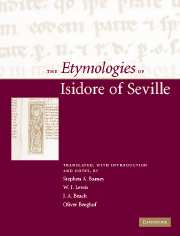Book contents
- Frontmatter
- Contents
- Acknowledgements
- Note to the Reader
- INTRODUCTION
- THE ETYMOLOGIES
- Analytical table of contents
- Book I Grammar (De grammatica)
- Book II Rhetoric and dialectic (De rhetorica et dialectica)
- Book III Mathematics (De mathematica)
- Book IV Medicine (De medicina)
- Book V Laws and times (De legibus et temporibus)
- Book VI Books and ecclesiastical offices (De libris et officiis ecclesiasticis)
- Book VII God, angels, and saints (De deo, angelis et sanctis)
- Book VIII The church and sects (De ecclesia et sectis)
- Book IX Languages, nations, reigns, the military, citizens, family relationships (De linguis, gentibus, regnis, militia, civibus, affinitatibus)
- Book X Vocabulary (De vocabulis)
- Book XI The human being and portents (De homine et portentis)
- Book XII Animals (De animalibus)
- Book XIII The cosmos and its parts (De mundo et partibus)
- Book XIV The earth and its parts (De terra et partibus)
- Book XV Buildings and fields (De aedificiis et agris)
- Book XVI Stones and metals (De lapidibus et metallis)
- Book XVII Rural matters (De rebus rusticis)
- Book XVIII War and games (De bello et ludis)
- Book XIX Ships, buildings, and clothing (De navibus aedificiis et vestibus)
- Book XX (Provisions and various implements)
- APPENDIX Correspondence of Isidore and Braulio
- INDEX
Book VII - God, angels, and saints (De deo, angelis et sanctis)
Published online by Cambridge University Press: 22 September 2009
- Frontmatter
- Contents
- Acknowledgements
- Note to the Reader
- INTRODUCTION
- THE ETYMOLOGIES
- Analytical table of contents
- Book I Grammar (De grammatica)
- Book II Rhetoric and dialectic (De rhetorica et dialectica)
- Book III Mathematics (De mathematica)
- Book IV Medicine (De medicina)
- Book V Laws and times (De legibus et temporibus)
- Book VI Books and ecclesiastical offices (De libris et officiis ecclesiasticis)
- Book VII God, angels, and saints (De deo, angelis et sanctis)
- Book VIII The church and sects (De ecclesia et sectis)
- Book IX Languages, nations, reigns, the military, citizens, family relationships (De linguis, gentibus, regnis, militia, civibus, affinitatibus)
- Book X Vocabulary (De vocabulis)
- Book XI The human being and portents (De homine et portentis)
- Book XII Animals (De animalibus)
- Book XIII The cosmos and its parts (De mundo et partibus)
- Book XIV The earth and its parts (De terra et partibus)
- Book XV Buildings and fields (De aedificiis et agris)
- Book XVI Stones and metals (De lapidibus et metallis)
- Book XVII Rural matters (De rebus rusticis)
- Book XVIII War and games (De bello et ludis)
- Book XIX Ships, buildings, and clothing (De navibus aedificiis et vestibus)
- Book XX (Provisions and various implements)
- APPENDIX Correspondence of Isidore and Braulio
- INDEX
Summary
i. God (De deo) 1. The most blessed Jerome, a most erudite man and skilled in many languages, first rendered the meaning of Hebrew names in the Latin language. I have taken pains to include some of these in this work along with their interpretations, though I have omitted many for the sake of brevity. 2. Indeed, exposition of words often enough reveals what they mean, for some hold the rationale of their names in their own derivations.
First, then, we present the ten names by which God is spoken of in Hebrew. 3. The first name of God in Hebrew is El. Some translate this as “God,” and others as ἰσχυρός, that is, “strong” (fortis), expressing its etymology, because he is overcome by no infirmity but is strong and capable of accomplishing anything. 4. The second name is Eloi (i.e. Elohim), 5. and the third Eloe, either of which in Latin is ‘God’ (Deus). The name Deus in Latin has been transliterated from a Greek term, for Deus is from δέος in Greek, which means φόβος, that is, “fear,” whence is derived Deus because those worshipping him have fear. 6. Moreover ‘God’ is properly the name of the Trinity, referring to the Father and the Son and the Holy Spirit. To this Trinity are referred the remaining terms posited below of God.
- Type
- Chapter
- Information
- The Etymologies of Isidore of Seville , pp. 153 - 172Publisher: Cambridge University PressPrint publication year: 2006

